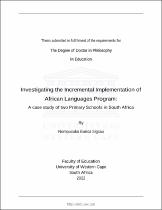| dc.contributor.advisor | Kaschula, Russell | |
| dc.contributor.author | Sigcau, Nompucuko Eurica | |
| dc.date.accessioned | 2023-11-13T08:13:27Z | |
| dc.date.available | 2023-11-13T08:13:27Z | |
| dc.date.issued | 2023 | |
| dc.identifier.uri | http://hdl.handle.net/11394/10519 | |
| dc.description | Doctor Educationis | en_US |
| dc.description.abstract | The study seeks to investigate the Incremental Introduction of African Languages (IIAL) program in relation to the teaching and learning of isiXhosa in Grade two classes. It is set to focus on the guidelines for implementation of IIAL, in schools that did not implement African languages in the Foundation Phase before. The complexity of multilingualism in South Africa where African languages are given a lower status than English and Afrikaans. Furthermore, the teaching of African languages as additional languages assumes a particular substance in my study. The purpose of my study then is to find out the teaching strategies that are being used by the isiXhosa teachers in implementing IIAL to multilingual learners with different linguistic backgrounds, and the type of support given to teachers by the Department of Basic Education (DBE) in implementing IIAL, which is a new program meant to focus on the development of African Languages. The implications of IIAL for accommodating language diversity will also be taken into consideration.
The main theories used are Bronfenbrenner’s Ecological Systems theory (1978) and Vygotsky Sociocultural theory (1978) that focuses on the family, economy and political structures as factors that influence a child’s transition into adulthood. Some other theoretical pespectives are also employed. To achieve my research objectives, I used a qualitative research design with indepth interviews, class observations as well as document analysis. The research participants were teachers teaching in the Foundation Phase in the former Model C schools in the Northern Suburbs, Curriculum Advisors as well as the Government official in the Western Cape Education Department (WCED). In reviewing literature, I found that a lot has been done in South Africa with regards to the teaching and learning of African languages in Higher education as well as politics revolving the area. However, there is little that has been done on Foundation Phase research in these areas. Presently there is no study that has looks at the implementation of IIAL focusing on teaching and learning isiXhosa as Second Additional Language in former Model C 4 Schools. It is assumed that the study will come up with more strategies and guidelines on how to teach African languages to multilingual learners in the Foundation Phase. | en_US |
| dc.language.iso | en | en_US |
| dc.publisher | University of the Western Cape | en_US |
| dc.subject | South Africa | en_US |
| dc.subject | African Languages | en_US |
| dc.subject | isiXhosa | en_US |
| dc.subject | Incremental Introduction of African Languages (IIAL) | en_US |
| dc.subject | Western Cape Education Department (WCED) | en_US |
| dc.subject | Department of Basic Education (DBE) | en_US |
| dc.title | Investigating the incremental implementation of African languages program: a case study of two primary schools in South Africa | en_US |
| dc.rights.holder | University of the Western Cape | en_US |

